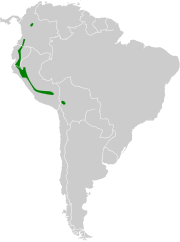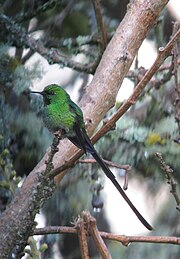
Gaius Valerius Catullus, known as Catullus, was a Latin neoteric poet of the late Roman Republic. His surviving works remain widely read due to their popularity as teaching tools and because of their personal or sexually explicit themes.

Hummingbirds are birds native to the Americas and comprise the biological family Trochilidae. With approximately 366 species and 113 genera, they occur from Alaska to Tierra del Fuego, but most species are found in Central and South America. As of 2024, 21 hummingbird species are listed as endangered or critically endangered, with numerous species declining in population.

The rufous hummingbird is a small hummingbird, about 8 cm (3 in) long with a long, straight and slender bill. These birds are known for their extraordinary flight skills, flying 3,200 kilometres during their migratory transits. It is one of nine species in the genus Selasphorus.

The hummingbird hawk-moth is a species of hawk moth found across temperate regions of Eurasia. The species is named for its similarity to hummingbirds, as they feed on the nectar of tube-shaped flowers using their long proboscis while hovering in the air; this resemblance is an example of convergent evolution.

The bee hummingbird, zunzuncito or Helena hummingbird is a species of hummingbird, native to the island of Cuba in the Caribbean. It is the smallest known bird. The bee hummingbird feeds on nectar of flowers and bugs found in Cuba.

Lesbia was the literary pseudonym used by the Roman poet Gaius Valerius Catullus to refer to his lover. Lesbia is traditionally identified with Clodia, the wife of Quintus Caecilius Metellus Celer and sister of Publius Clodius Pulcher; her conduct and motives are maligned in Cicero's extant speech Pro Caelio, delivered in 56 BC.

Catullus 11 is a poem by Catullus.

Allen's hummingbird is a species of hummingbird that breeds in the western United States. It is one of seven species in the genus Selasphorus.

The red-tailed comet is a medium-sized hummingbird belonging to tribe Lesbiini of subfamily Lesbiinae, the "coquettes". It is found in Argentina and Bolivia and possibly Chile and Peru.

Rivoli's hummingbird, also known as the magnificent hummingbird, is a species of hummingbird in the "mountain gems", tribe Lampornithini in subfamily Trochilinae. It is found in El Salvador, Guatemala, Honduras, Mexico, Nicaragua, and the United States.

Catullus 5 is a passionate ode to Lesbia and one of the most famous poems by Catullus. The poem encourages lovers to scorn the snide comments of others, and to live only for each other, since life is brief and death brings a night of perpetual sleep. This poem has been translated and imitated many times.

Lesbia Venner Harford was an Australian poet, novelist and political activist. She was one of the first women to study for a law degree at the University of Melbourne. She agitated for the rights of workers, supporting a group of union workers who were imprisoned for treason and other crimes. A later reading of Harford's poetry and biography have raised her profile as a pioneer of 'free love' and a queer icon.

The poetry of Gaius Valerius Catullus was written towards the end of the Roman Republic in the period between 62 and 54 BC.

The broad-billed hummingbird is a small-sized hummingbird that resides in Mexico and the southwestern United States. The bird displays sexual dimorphism, and the juveniles resemble the female adult more than the male adult. The broad-billed hummingbird is a bright coloured bird with a broad and bright red bill. The bird is also known for its other common names – the Colibrí Pico Ancho in Spanish and Colibri circé in French. It is a diurnal bird.

The green-tailed trainbearer is a species of hummingbird in the "coquettes", tribe Lesbiini of subfamily Lesbiinae. It is found in Bolivia, Colombia, Ecuador, Peru, and possibly Venezuela.
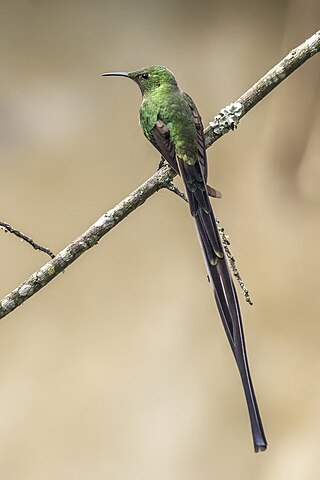
The black-tailed trainbearer is a species of hummingbird in the family Trochilidae. It is found between 2500 and 3800m in Colombia, Ecuador, and Peru. Its natural habitats are subtropical or tropical moist montane forest, subtropical or tropical high-altitude shrubland, and heavily degraded former forest.
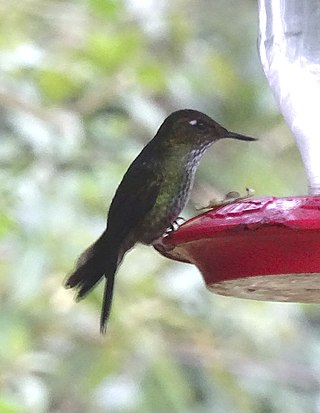
The mountain avocetbill is a species of hummingbird in the "coquettes", tribe Lesbiini of subfamily Lesbiinae. It is found in Colombia, Ecuador, and Peru.
Lesbia was a figure in Roman poetry. Lesbia can also refer to:
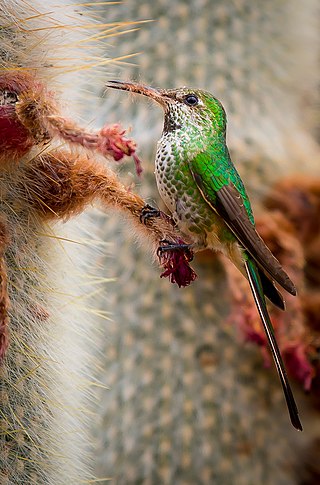
Lesbiinae is one of the six subfamilies that make up the hummingbird family Trochilidae.

Lesbiini is one of the two tribes that make up the subfamily Lesbiinae in the hummingbird family Trochilidae. The other tribe is Heliantheini (brilliants).


